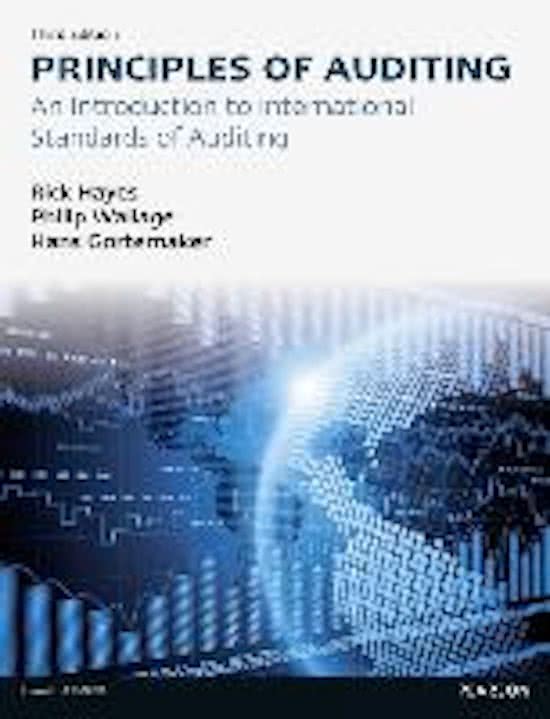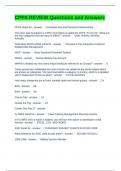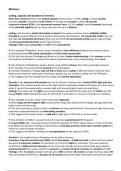Session 1
Chapter 1
Auditing
Importance of auditing
Investors and creditors (= stakeholders) have different objectives than management.
Because management is responsible for preparing and presenting the financial statements
of a company, and the stakeholders are using them, stakeholders need to make sure that the
financial statements give a fair and correct representation of the company → an auditor
provides an independent and expert opinion on the fairness of the reports, called an audit
opinion.
Future of auditing
In the future, as is the case today, the annual report, financial statements, notes and
auditors’ reports will be required. In addition to these, however, there will also be a
director’s report on corporate governance (e.g. effectiveness of internal control systems),
and an environmental management report.
International accounting and auditing standards
International financial reporting standards (IFRS)
When doing an external audit, the auditor checks if the client followed the rules set by
financial accounting standards, mostly IFRS (formerly known as IAS) issued by the
International Accounting Standards Board (IASB).
International standards on auditing (ISA)
To make sure auditing is done on a consistent basis throughout the world, auditing
standards are issued by the International Auditing and Assurance Standards Board (IAASB).
They provide standards for auditing, reviewing, assurance activities etc. The standard that is
used for auditing is International Standards on Auditing (ISA). These standards are not
intended to override national standards and can be voluntary adopted.
An audit defined
Definition
An audit is a systematic process of objectively (i.e. independently) obtaining and evaluating
evidence regarding assertions about economic actions and events to ascertain the degree of
correspondence between these assertions and established criteria, and communicating the
results to interested users:
- Systematic → the audit follows a structured, documented plan (i.e. audit plan)
- Obtaining and evaluating evidence → the auditor assesses the reliability and
sufficiency of the information contained in the underlying accounting records and
other source data
- Assertions → representations by management that are embodied in financial
statements, e.g. all assets reported on the balance sheet actually exist at the balance
sheet date or the reported sales did actually occur. Three categories of assertions:
about classes of transactions and events for the period under audit, about account
balances at the period end and about presentation and disclosure.
1
, - Ascertaining the degree of correspondence → test most assertions by examining
the physical evidence of documents, confirmation, inquiry, and observation
- Communicating the results (= objective) → the audit is conducted with the aim of
expressing an informed and credible opinion in a written report
Types of audits
There are three different types of audits:
1. Audits of financial statements (i.e. financial audit)
Examining financial statements to determine if they give a true and fair view of the
financial statements in conformity with specified criteria (e.g. IFRS or GAAP). The
majority of audit work is concerned with the financial statements. These audits have
to give reasonable assurance if financial statements are free from material
misstatements.
Material misstatements = misstatements, including omissions, are considered to be
material if, individually or in the aggregate, they could reasonably be expected to
influence the economic decisions of users taken on the basis of the financial
statements.
2. Operational audit
It reviews all or part of the organization’s operating procedures to evaluate
effectiveness and efficiency of the operation:
- Effectiveness → whether an organization achieves its goals and objectives
- Efficiency → how well an organization uses its resources to achieve its goals
Recommendations are usually made to the management for improving operations.
For these audits, there are less standards and rules (COSO) and therefore require
more subjective judgement.
3. Compliance audit
Reviewing organization’s procedures to determine whether the organization is
following specific procedures, rules or regulations set out by some higher authority.
Compliance audits are quite common in not-for-profit organizations (partially)
funded by government.
Types of auditors
There are two types of auditors:
- External auditors → have the responsibility to the performance of the audit function on
financial statements.
- Internal auditors → employed by individual companies to investigate and appraise the
effectiveness of company operations for management. Much of their attention is often given
to the assessment of internal controls.
Audit process
The audit process consists of the following steps:
I. Client acceptance
II. Planning
III. Testing and evidence
IV. Evaluation and reporting
2
,Session 2
Chapter 2
Theories on the demand and supply of audit services
Policeman theory
Up until the 1940s it was widely held that an auditor’s job was to focus on arithmetical
accuracy and on prevention and detection of fraud. From the 1940s until the 2000s, there
was a shift implying that auditing had to verify the truth and fairness of financial
statements. Nowadays, there is a public debate on the auditor’s responsibility for detection
and disclosure of fraud, returning us to the basic public perceptions on which this theory
derives.
The lending credibility theory
Another public perception is that the primary function of auditing is the addition of
credibility to the financial statements. Stakeholders have to have faith that the financial
statements give a fair representation of reality, because they have to make their
judgements/decisions based on these financial statements.
Limperg’s theory of inspired confidence
Limperg’s theory addresses both the demand and supply of audit services:
- Demand (= companies) → direct consequence of the participation of outside stakeholders
(third parties) in the company. These stakeholders demand accountability from
management.
- Supply (= audit firms) → level of audit assurance that the auditor should provide.
Normative theory = the auditor should act in such a way that he does not disappoint the
public expectations, while, on the other hand, he should not arouse greater expectations
that he can’t live up to.
Agency theory
Agency theory = when one party (= principal) delegates power and decision-making
authority to another party (= agent) to perform a service.
In these situations, asymmetric information may arise → the principal cannot easily
monitor the agent’s actions. The agent knows more than the principal (private information).
Costs of an agency relationship are monitoring costs, bonding costs and residual loss. Audits
are performed in order to reduce the asymmetric information.
Legal liability
Liability under common law (contract)
Liability for auditors under common law generally falls in two categories:
- Liabilities to clients
A typical civil lawsuit filed by a client involves a claim that the auditor did not
discover financial statement fraud or employee fraud because the auditors showed
negligence in the conduct of an audit.
- Liabilities to third parties
Third parties include all stakeholders in an audit other than the audit client. An audit
firm may be liable to third parties such as banks that have incurred a loss due to
reliance on misleading financial statements.
3
, Civil liability under statutory law (civil, criminal)
A professional auditor may be held criminally liable under the laws of a country or district
that make it a criminal offence to defraud another person through knowingly being involved
with false financial statements. Liable under civil law → not following the procedures, the
auditors missed something they should have identified.
Liabilities as members of professional accounting organizations (oversight)
Nearly all national audit professions have some sort of disciplinary court (e.g. NBA). The
disciplinary court typically consists of representatives of the audit and legal professions, and
sometimes representatives of the general public. The sanctions may vary (e.g. fines,
suspension for a limited period of time or lifetime ban).
Solutions to auditor liability
Financial risks resulting from litigation for audit firms might be a threat to the viability of the
audit profession. In order to reduce this risk, several measures are considered:
- Use of a limit or cap on claims (i.e. a maximum settlement amount)
- System of proportionate liability → in such a system, an audit firm is only liable to the
extent to which the loss is attributable to the auditor (and not the entire loss)
- Firm insuring themselves against litigation
- Exclude certain activities with a higher risk profile from the auditors’ liability
Audit expectation gap
Expectation gap
Audit expectation gap → results from the fact that users of audit services (= companies &
stakeholders) have expectations regarding the duties of auditors that exceed the current
practice in the profession.
There are gaps in expectations in the following areas:
- Fairness of financial statements
Expectation → financial statements with an unmodified (unqualified) audit opinion
are completely free from error.
Reality → auditor can only give reasonable assurance (an audit has its limitations).
- Company’s ability to continue as a going concern
Expectation → auditor gives assurance regarding possible bankruptcy.
Reality → auditor can’t give full assurance regarding future events, auditors only
warn users for possible financial distress.
- Company’s internal control system
Expectation → auditor finds all internal control deficiencies.
Reality → auditor can’t find all internal control deficiencies, auditors mostly examine
a specific part (reliable financial reporting).
To mitigate this expectation gap, the COSO published a report on the definitions,
quality, benchmarks and adequacy of internal controls.
- Occurrence of fraud
Expectation → auditor finds all existing fraud cases and reports them.
Reality → auditor doesn’t find or investigate all fraud cases, because investigation is
very costly and time-consuming.
- Occurrence of illegal acts
4






